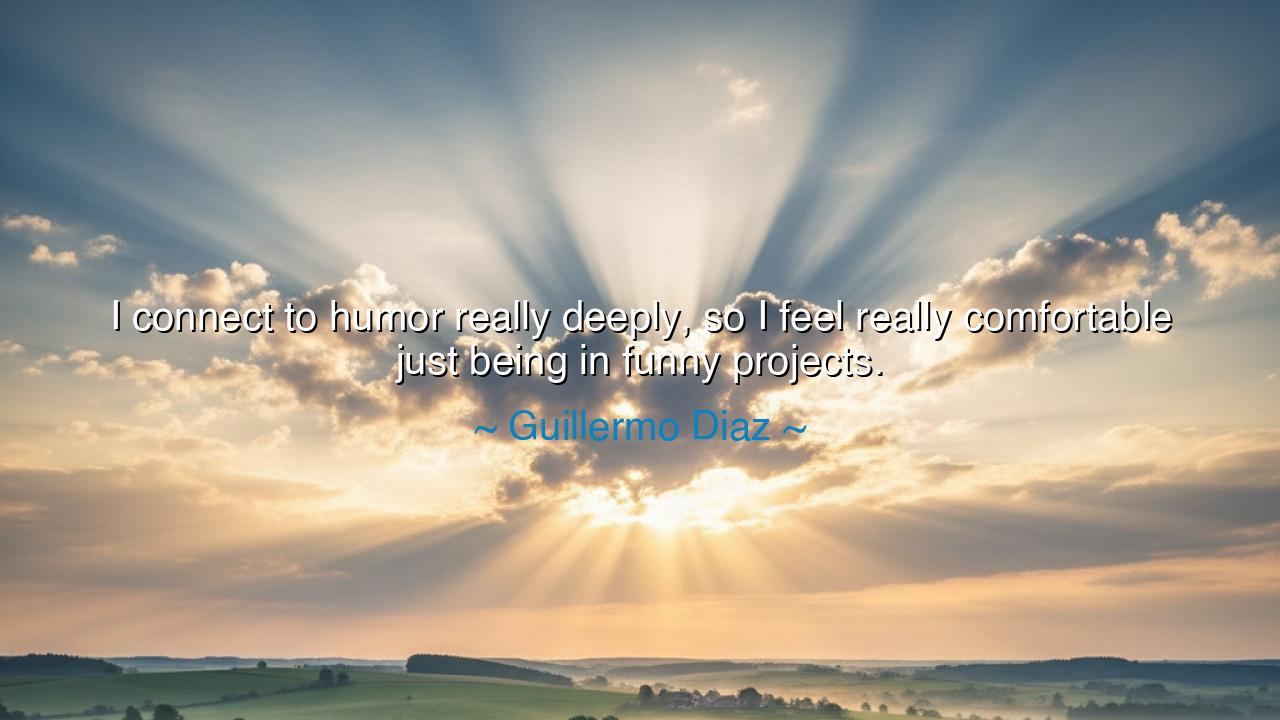
I connect to humor really deeply, so I feel really comfortable
I connect to humor really deeply, so I feel really comfortable just being in funny projects.






When Guillermo Díaz said, “I connect to humor really deeply, so I feel really comfortable just being in funny projects,” he spoke not as a performer alone, but as a philosopher of the spirit. In those few words, he revealed a truth as ancient as humanity itself: that humor is a sacred bond, a bridge between pain and peace, fear and freedom. To “connect to humor deeply” is not to escape life, but to understand it—its absurdity, its impermanence, its beauty hidden beneath struggle. Díaz’s statement is both personal and universal, for laughter has always been humanity’s oldest medicine, its gentlest rebellion against despair.
In the world of art, to feel comfortable in humor is to have found one’s natural rhythm with the universe. The ancients would have called it eudaimonia—the harmony of soul and action. When a man finds joy in his calling, when his work flows as easily as breath, he becomes not an imitator but a vessel of truth. For Díaz, that calling is laughter. His words remind us that comedy is not lesser than tragedy, but its necessary counterpart. The wise have long known that laughter, when born from empathy, can carry the same weight as tears. The difference lies only in tone: one heals through sorrow, the other through light.
To connect deeply to humor, as Díaz does, requires courage. It demands that one look directly at the world’s darkness and choose to laugh—not in mockery, but in defiance. Humor is an act of resistance, a refusal to let pain dictate the heart’s rhythm. The great playwright Aristophanes, who lived during the wars and chaos of ancient Athens, used laughter to challenge kings and awaken minds. His plays mocked the powerful not out of cruelty, but out of love for truth. Through laughter, he revealed folly, hypocrisy, and fear. So too does Díaz remind us that humor is not mere entertainment—it is wisdom wearing a smile.
History has shown us that those who live close to laughter often live close to truth. Consider Charlie Chaplin, whose silent films carried both comedy and sorrow in equal measure. In his tramp’s stumbling gait, the world saw itself: fragile, hungry, yearning, but still able to laugh. Chaplin’s laughter did not deny suffering; it transcended it. He connected to humor “really deeply,” as Díaz would say, because he understood that laughter can hold more compassion than words. In every fall, in every smile, there was love for humanity. That is the essence of Díaz’s quote—the understanding that humor is not the mask of the soul, but its song.
There is also humility in Díaz’s comfort with “funny projects.” It is the humility of one who does not seek prestige or pretense, but truth and connection. The ancients taught that the greatest art is that which brings people together. Humor, more than any other force, unites the human family. It dissolves barriers of language, culture, and pride. To live among laughter is to live among equals, for in laughter, all stand naked—no richer, no poorer, only human. When Díaz says he feels “comfortable,” it is not a comfort of ease, but of authenticity. It is the peace that comes from walking one’s path with honesty.
The deeper meaning of this quote lies in belonging—belonging not to a role or profession, but to the joy of being oneself. Those who find what makes them laugh find what makes them live. Humor connects us to the divine pulse of life, to that mysterious rhythm that carries both pain and beauty. In this way, Díaz’s words echo the wisdom of sages who taught that enlightenment is not always solemn—it can also be playful. The Buddha himself smiled beneath the Bodhi tree, for in seeing the truth of suffering, he also saw the humor in human striving.
And so, my listener, take this teaching to heart: connect deeply to what brings you joy, whatever it may be. If it is humor, let it guide you. If it is music, let it move you. To live truthfully is to live comfortably within one’s nature. Seek the places and people that make your spirit laugh, for laughter is a compass—it points not to escape, but to authenticity. And when the storms of life rise, let your humor be your lantern. Laugh not to forget, but to remember that even in the shadow, the heart still shines.
For Guillermo Díaz reminds us of something timeless: that to laugh deeply is to live deeply. And those who find their truth in laughter do not merely act—they awaken others to the joy of being alive.






AAdministratorAdministrator
Welcome, honored guests. Please leave a comment, we will respond soon